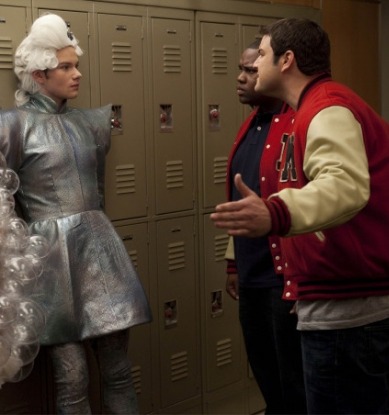Perhaps you heard about the Glee dustup. This Newsweek writer, a gay man, suggested that society isn't ready to accept gay actors in straight roles like we are the reverse. As an example, he offers up Glee guest star Jonathan Groff, a gay actor whose portrayal of a straight character had, in my view, been so flat and cartoonish that it bordered on series-wrecking. I hadn't thought it was because he was gay. I'd just thought he couldn't act. But in the writer's view, Groff doesn't work because the viewer can't stop seeing him as a theatre queen.
My initial reaction: meh. I don't see it. I think the boy just can't act. The questions the article asks about society's comfort with gays in the media are important, but I found its thesis unconvincing. I turned the page and forgot about it. A few days later, I learned from a hysterical Ryan Murphy (Glee's creator) that I'd read a "bigoted" piece that called on all gays to remain in the closest. I had? I went back and read the article again. No, I hadn't. Nevertheless, Murphy went full-tilt Jesse Jackson, calling for a boycott of Newsweek and apologies from all concerned. I was particularly concerned with Murphy's loose use of the term "bigoted." I saw far, far more hatefulness and ad homenium in Murphy's response than I did in the original article.
Which brings us to Kurt.
Kurt is an openly gay teenage character on Glee, portrayed by a gay actor. Through him, we see things never before seen on TV, most notably the rocky-but-accepting relationship between Kurt and his Mellencamp-loving, tire-store-running father. My gay friends uniformly point to that relationship as a watershed moment for gays in the media, something they wish they'd seen when they were growing up and dealing with the same issues. I can see that.

I like Kurt. He's impossible not to like. But I'm increasingly uncomfortable with how Murphy uses the character. Kurt—specifically Kurt's gayness, because the character apparently has no other qualities—is the metric by which we measure other characters' worth. Time and again, teachers, parents, and other students must choose whether to accept Kurt's flamboyant queenishness. He and his gayness are trotted out and made to sing a woman's part; dress like Lady Gaga at school; or, god help us, join the football team and perform the Single Ladies dance on the field during a play. And the other characters must unconditionally embrace these obnoxious stereotypes. The jocks on the football team not only accepted Kurt, they joined him in his dance and (cringe) won the game because they did. The message isn't complex: by embracing Kurt's gayness, you are redeemed. You transit from villain to hero with one twitch of your hips.
And what's wrong with a message of acceptance, you might reasonably ask? Nothing. Nothing at all.
But who, exactly, has Kurt accepted? I've seen him insult the other characters for being boring, or poor dressers, or stupid, or lower class, or slutty, or "such a boy." The moment Kurt's loving, nay, saintly father admitted that he'd had to adjust his expectations of going to ball games and talking about girls with his son, Kurt smacked him with a bitter "I'm sorry I'm such a disappointment to you." I've watched Kurt stalk a straight boy, no less a straight archetype than the school's quarterback. In service of his unrequited crush, Kurt tried to break up the boy's relationship, decorated the boy's bedroom like a whore's boudoir, and lunged at his face with a moist towelette. Then Kurt acted wounded when the implausibly patient boy's rebuke included the word "faggy." The next day, the boy sought Gay Jesus' forgiveness. Kurt would have none of it.
"I thought you were different," he sniffed, wounded.All the attention went to the epithet, but I am increasingly bothered that Kurt does not extend to the world the same tolerance that he unceasingly—and loudly—demands from it. The world must unconditionally accept him, never he it."I am different," protested the quarterback.
This is one-dimensional fantasy. Some might even say it's bigoted.